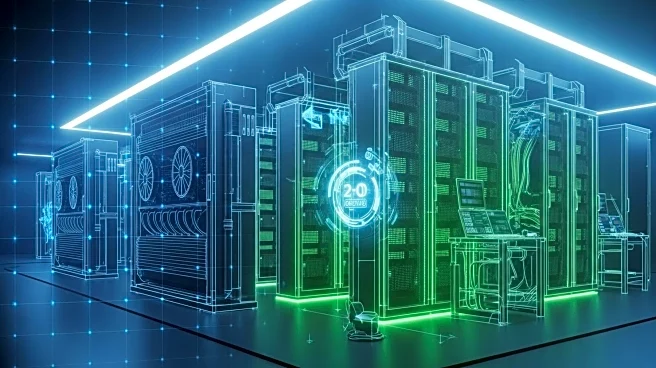What's Happening?
The Environmental Protection Agency (EPA) is planning to reform permitting rules to accelerate the construction of data centers across the United States. This initiative is designed to address delays in data center and related power generation projects. The proposed changes would allow certain construction activities, such as the installation of cement pads, to commence before a Clean Air Act permit is issued, provided these activities do not impact air emissions. The EPA intends to launch a rulemaking process to clarify the definition of 'Begin Actual Construction' under New Source Review (NSR) pre-construction permitting rules, differentiating between emissions-related and non-emissions-related activities. These reforms are part of a broader strategy by the Trump administration to enhance industrial capacity and promote investment in artificial intelligence.
Why It's Important?
The reforms proposed by the EPA are significant as they aim to support the growth of data centers, manufacturing, and energy infrastructure in the U.S. Data centers are crucial for the expansion of digital services and artificial intelligence, which are increasingly important for economic growth and technological advancement. By streamlining the permitting process, the EPA's actions could reduce construction delays, thereby facilitating quicker deployment of data center facilities. This could benefit industries reliant on data processing and storage, potentially leading to increased investment and job creation in the tech sector. However, the changes may also raise concerns among environmental groups regarding the potential impact on air quality and regulatory oversight.
What's Next?
The EPA will initiate a rulemaking process to implement these reforms, which will involve public consultations and feedback from stakeholders. This process will likely attract attention from various groups, including environmental advocates, industry representatives, and policymakers. The outcome of this rulemaking could influence future construction projects and regulatory practices. Stakeholders will be closely monitoring the developments to assess the implications for environmental standards and industrial growth. The reforms may also prompt discussions on balancing economic development with environmental protection.
Beyond the Headlines
The EPA's proposed reforms could have broader implications for regulatory practices in the U.S. By distinguishing between emissions-related and non-emissions-related construction activities, the agency may set a precedent for other sectors seeking to expedite project timelines. This approach could lead to a reevaluation of existing permitting processes, potentially influencing how environmental regulations are applied across various industries. Additionally, the focus on data centers highlights the growing importance of digital infrastructure in the modern economy, underscoring the need for policies that support technological innovation while addressing environmental concerns.









